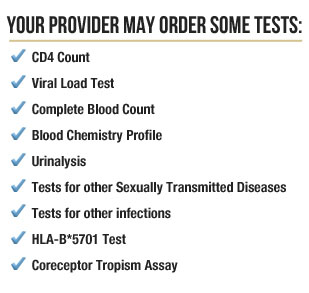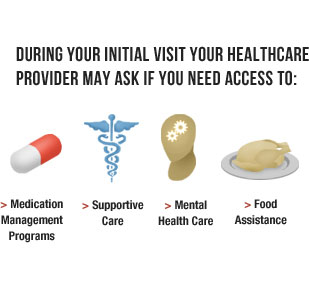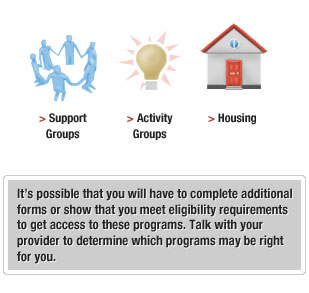First Steps to Treatment
You may feel a little overwhelmed when you first begin treatment for your HIV disease. During your first appointment, your healthcare provider should ask you questions about your medical history, conduct a physical exam, and order various medical tests. This is also a good time to ask all of the questions you may have about living with HIV and various treatment options available to you.
- The initial medical tests your provider may order will give a better understanding of how the HIV virus is affecting your immune system. Two of the most important tests will be a CD4 count and a viral load test. You may also take a drug resistance test to determine the best medication options for you. The results of all of these tests will provide a baseline measurement for future tests.
Your provider may also order some other tests:
- Complete blood count
- Blood chemistry profile (including liver and kidney function tests)
- Urinalysis
- Tests for other sexually transmitted diseases (STDs)
- Tests for other infections, such as hepatitis, tuberculosis, or toxoplasmosis
- An HLA-B*5701 test: Checks to see if you have a sensitivity to a specific HIV medication (abacavir) and should avoid taking it.
- Coreceptor tropism assay: Checks to see if a specific type of HIV medication is appropriate for you. This test is usually used only if your body has shown resistance to other medications.
Other Needs and Services
When you are beginning treatment for HIV, you may need other services and/or support. During your initial few visits your healthcare provider or case manager may ask you if you need access to the following:
- Housing
- Supportive care and in-home health care
- Mental health care
- Food assistance
- Support groups
- Activity groups
- Pharmacy-assisted medication management programs
It’s possible that you will have to complete additional forms or show that you meet eligibility requirements to get access to these programs. Talk with your provider to determine which programs may be right for you.
Related Topics on AIDS.gov
Frequently Asked Questions
What is HIV treatment?
HIV treatment uses a combination of antiretroviral medications to help the immune system guard itself from the HIV virus. Although HIV medications can treat HIV infection, they cannot cure it.
Do I have to take medication for my HIV disease?
Just because you are HIV-positive does not automatically mean you have to start taking HIV (antiretroviral) medications. Starting HIV treatment can depend on the amount of virus in your blood (viral load) and how well your immune system is working. For more information, see AIDSinfo’s HIV and Its Treatment: What You Should Know.
I tested positive for HIV. Does that mean I have AIDS?
Not necessarily. A positive HIV test result means simply that you are infected with the HIV virus. If you do not get treatment for your HIV disease, it will eventually progress to AIDS. For more information, see CDC’s Basic Information on HIV/AIDS
Additional Resources
- NIAID - Treatment of HIV Infection
- AIDSInfo - HIV and Its Treatment: What You Should Know
Last revised: 06/01/2012



